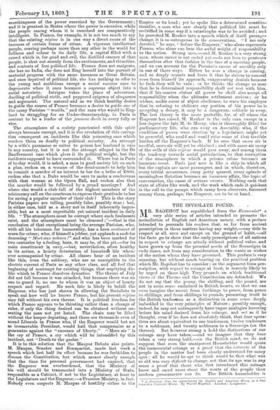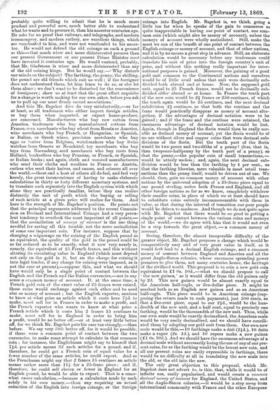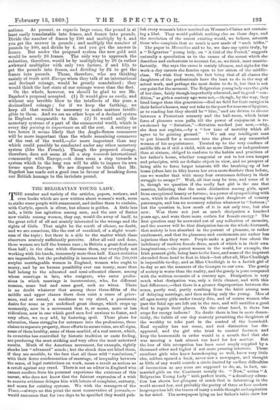THE INVIOLATE POUND. •
BAGEHOT has republished from the Economist* a I very able series of articles intended to promote the assimilation of English and American money, with a preface intended to persuade his readers that, so far from ancient prescription in these matters having any weight,—any title to respect at all, save and except on the ground of habit,—all the facts go to show that the early prescriptions of all nations in respect to coinage are utterly without political value, and have grown up from the personal needs of the Sovereigns in rude times, not from any consideration to the wants or wishes of the nation whom they have governed. This preface is very amusing, but without much bearing on the practical problem which Mr. Bagehot has to consider ; as the argument from prescription, with regard to coinage at least, is scarcely likely to be urged on those high Tory grounds on which traditional views of the Throne and the Constitution are defended. We do not say that the penny, the shilling, and the pound, are not in some sense enshrined in British hearts, so that we can even imagine the ascent from farthings to pence, from pence to shillings, and from shillings to pounds, presenting itself to the British tradesman as a distinction in some sense deeply imbedded in the very principles of Nature ; possibly enough, indeed, he may not unfrequently have vague analogies hovering before his mind derived from his coinage, and act as if he thought, even if he does not absolutely think, that four operatives are about equivalent to one tradesman, twelve tradesmen to a nobleman, and twenty noblemen to a Sovereign (on the throne). But however strong a hold the distinctions of our coinage may have taken,—and we imagine that they have taken a very strong hold,—on the British mind, we do not suppose that even the omnipotent Householder would quote the immemorial coinage as a proof that the interests of the people in the matter had been clearly understood for many ages : all he would be apt to think would be that what was so old was very difficult to change, not that its age was in any sense a proof that those who first introduced this coinage knew and cared more about the wants of the people than modern governments can do. The British householder is probably quite willing to admit that he is much more prudent and powerful now, much better able to understand what he wants and to procure it, than his ancestor centuries ago. He asks for no proof that railways, and telegraphs, and modern ironmongery, and modern cutlery, are excellent things, which are vouchsafed to him, and were not vouchsafed to his ancestor. He would not defend the old coinage on such a ground as this—that much wiser and more disinterested persons than our present Government or our present Prime Minister must have invented it centuries ago. He would contend, probably, that Mr. Gladstone is wiser and more disinterested than any of the old coining kings. But he would say,— Why disturb our minds on the subject? The farthing, the penny, the shilling, the pound are old friends which suit us well ; if the foreigner does not understand them, let him learn to do so, or else let them alone ; we don't want to be disturbed for the convenience of foreigners ; show us at least that the great effort requisite for a change is worth making for our own sakes, before you ask us to pull up our most firmly rooted associations.'
And this Mr. Bagehot does do very satisfactorily,—so far at least, as all tradesmen who either import foreign articles, or buy them when imported, or export home-produce, are concerned. Manufacturers who buy raw cotton from America, tradesmen who buy manufactured cottons from France, corn merchants who buy wheat from Russia or America, wine merchants who buy French, or Hungarian, or Spanish, or Italian, or Greek wines, provision merchants who buy eggs or butter from Belgium, watchmakers who buy Swiss watches from Geneva or Neuchatel, toy merchants who buy toys from Nuremberg, seed merchants who buy roots from Holland, booksellers who buy Prussian, or French, or Spanish, or Italian books ; and again, cloth and worsted manufacturers who send their cloths and woollens to France or Austria, cutlers who send their knives, and razors, and scissors all over the world,—these and a host of others all do feel, and feel very keenly, the great inconvenience of having to make elaborate calculations in thirty or forty different monetary systems, and to translate each separately into the English system with which alone they are practically familiar, before they can realize distinctly the unit of profit which the buying or selling of each article at a given price will realize for them. And here is the strength of Mr. Bagehot's position. He points out that the principal arguments addressed to the recent Commission on Decimal and International Coinage had a very prevalent tendency to overlook the most important of all points,— that the assimilation of moneys of account is the one thing needful for saving all this trouble, not the mere assimilation of some one important coin. For instance, suppose that by charging a seignorage on the coining of the English pound as an equivalent, the quality of the gold in the pound could be so far reduced as to be exactly, what it now very nearly is, namely, the equivalent of 25 French francs, and this without altering its circulating value in England (which must depend not only on the gold in it, but on the charge for coining it into legal tender, if any charge for coining were imposed, as is not the case at present),—suppose this, and what we should have would only be a single point of contact between the English and the French and the Italian currencies,—not in any sense a common money of account. If, at the same time, a French gold coin of the exact value of 25 francs were coined, those coins would exchange against each other and be used also as money of account ; but the English exporter, anxious to know at what price an article which it costs here 7id. to make, must sell for in France in order to make a profit, and the French exporter who wants to know at what price a French article which it costs him 2 francs 15 centimes to make, must sell for in England in order to bring him a profit, would be no better off,—or at least very little better off, for we think Mr. Bagehot puts his case too strongly,—than before. We say very little better off, for it would be possible, if there were a common point of contact between the two currencies, to make some attempt to calculate in that common coin ; for instance, the Englishman might say to himself that 70. per article means 32 such articles for a pound, and if, therefore, he could get a French coin of equal value for a fewer number of the same articles, he could export. And so the Frenchman might say that 2 francs 15 centimes an article means rather more than 111 for a 25-franc piece ; and if, therefore, he could sell eleven or fewer in England for an English pound, he would be able to export. That is a somewhat easier calculation,—because a calculation made by each solely in his own money,—than any requiring an actual reduction of the English into foreign coinage, or the foreign coinage into English. Mr. Bagehot is, we think, going a little too far when he speaks of the gain to commerce as quite inappreciable in having one point of contact, one common coin (which might also be money of account), unless the moneys of account were wholly assimilated. Still, make the most we can of the benefit of one point of contact between the English coinage or money of account, and that of other nations, and it is by no means a great step in advance. Still, an elaborate calculation would be necessary before any tradesman could translate his unit of price into the foreign country's unit of price, and without this nothing really important for international purposes is gained. Moreover, the gaining of a good gold unit common to the Continental nations and ourselves would be of little avail unless that unit were decimally subdivided both abroad and at home. Now, the supposed gold unit, equal to 25 French francs, would not be decimally subdivided either abroad or at home. In France the tenth part of the new coin would be francs or 250 centimes, of which the tenth again would be 25 centimes, and the next decimal subdivision 2-} centimes, so that both the centime and the franc would practically disappear as money of account altogether, if the advantages of decimal notation were to be gained ; and if the franc and the centime were retained, the enormous advantage of decimal notation would be lost. Again, though in England the form would then be really useable as decimal money of account, yet the florin would be of no use without silver and copper coins that were decimal subdivisions of the florin. But the tenth part of the florin would be two pence and two-fifths of a penny! (less, that is, than twopence-halfpenny by the tenth part of a penny), so that the penny,—the popular coin of small transactions,— would be utterly useless ; and, again, the next decimal subdivision would be less than the farthing by 4 per cent., so that the farthing likewise, more valuable in most retail transactions than the penny itself, would be driven out of use. We should, then, gain no common money of account with other nations by the universal adoption of a 25-franc piece equal to one pound sterling, unless both France and England, and all other foreign nations as far as we know, completely withdrew their smaller coins, in place of which we at least should have to substitute coins entirely incommensurable with them in value, so that during the interval of transition our poor people would be driven to madness. And though we do not quite agree with Mr. Bagehot that there would be no good in getting a single point of contact between the various coins and moneys of the world,—we do agree with him that it would not even be a step towards the great object,— a common money of account.
Seeing, therefore, the almost insuperable difficulty of the greater object, Mr. Bagehot proposes a change which would be comparatively easy and of very great value in itself, as it would both lead to a decimal English coinage, and a common money of account between England and America and all the great Anglo-Saxon colonies, whose enormous spreading power promises to give them, not many centuries hence, the heritage of the civilized world. This proposal is to coin a new gold coin equivalent to £1 Os. 10d.,—what we should propose to call the new guinea,' as it would differ from the old guinea only by 2d. This new guinea would be almost exactly equal to the American half-eagle, or five-dollar piece. It might be marked both as an English new guinea and as an American half-eagle. This piece would be in American coinage (supposing the return made to cash payments), just 500 cents, so that a five-cent piece, equal to our 20., would be the hundredth of the new unit, and a half cent, equal to precisely one farthing, would be the thousandth of the new unit. Thus, while our own scale would be exactly decimalized, the American scale would be very easily decimalized, and we should have conciliated them by adopting our gold unit from them. Our own new scale would be this,-10 farthings make a doit (20.), 10 doits make a rupee (2s. id.), and 10 rupees make a new guinea (£1 Os. 10d.). And we should have the enormous advantage of a decimal scale without necessarily losing the use of any of our present coins, for as the farthing would be the lowest new coin, and all our present coins are easily expressible in farthings, there would be no difficulty at all in translating the new scale into the old, or the old into the new.
The only great objection to this proposal, which Mr. Bagehot does not advert to, is this, that, while it would be of infinite use, easily popularized, and would create a common decimal money of account for England, the United States, and all the Anglo-Saxon colonies,—it would be a step away from international community with France and the other European nations. At present, as regards large sums, the pound is at least easily translatable into francs, and francs into pounds. Divide the number of franca by 100 and multiply by 4, and you get the answer in pounds ; and multiply the number of pounds by 100, and divide by 4, and you get the answer in francs. But under the proposed system the new gold unit would be nearly 26 francs. The only way to approach the reduction, therefore, would be by multiplying by 26 (a rather awkward multiplier with only two factors. 2 and 13), to get the pounds into francs, and dividing by 26 to get the francs into pounds. Those, therefore, who are thinking mainly of trade with Europe when they talk of an international and decimal coinage, would be greatly scandalized ; they would think the last state of our coinage worse than the first.
On the whole, however, we should be glad to see Mr. Bagehot's proposal accepted. (1) It would give us easily, and without any terrible blow to the intellects of the poor, a decimalized coinage ; for if we keep the farthing, we keep all that would be necessary to make matters intelligible to them. And we see no other hope of a decimal system in England comparable to this. (2) It would unify the monetary systems of a part of the commercial world, which is every day gaining in importance on all the rest. A century or two hence it seems likely that the Anglo-Saxon commerce will be more important than the whole remaining commerce of the rest of the world,—far more important than any which could possibly be conducted under any other monetary system (like the French). Though the proposed change, therefore, does not seem at all a step towards international community with Europe,—it does seem a step towards a system which in the long run will be able to impose its own terms upon Europe. We are disposed to think that Mr. Bagehot has made out a good case in favour of breaking down our British homage to the inviolate pound.
































 Previous page
Previous page